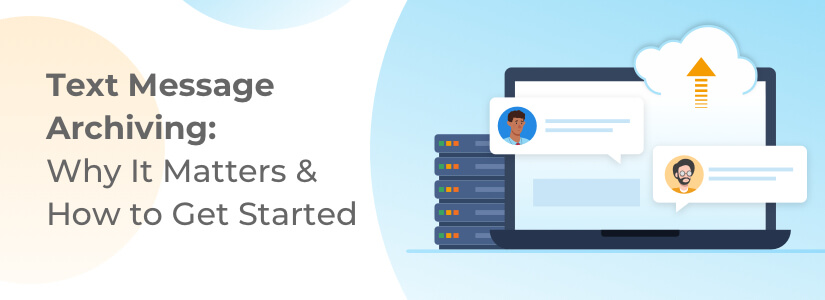Text Message Archiving: Why It Matters & How to Get Started

There are more than 6.8 billion smartphone users in the world today — that’s nearly 87% of the global population and a nearly 87% increase in total users from 2016. With astronomical figures such as these — which are only expected to increase in years to come — it’s clear that smartphones have become an integral part of how we communicate. This is as true in the corporate sector, where smartphones and other mobile devices have become essential pieces of work equipment, as it is in our personal lives.
The dramatic increase in mobile adoption, especially as it pertains to smartphones, has led to an equally dramatic increase in the use of text and short message service (SMS) messages. In the United States alone, mobile users sent roughly 2 trillion SMS messages in 2021. Today, organizations use text and SMS messages not only for internal business communications, but also as a marketing tool, as they enable businesses to connect with consumers in a more personal, casual way. In fact, 91% of consumers surveyed are interested in signing up for marketing texts.
As with all other forms of business and marketing communications, it’s important that organizations archive text and SMS exchanges for compliance, eDiscovery and information management purposes; this guide is here to show you how.
What Is Text Message Archiving?
Text message archiving, sometimes known as mobile archiving, refers to the process by which organizations capture and digitally preserve the contents of text and SMS messages within a secure, centralized repository. It is closely related to other forms of electronic data archiving, such as email archiving and social media archiving.
At a high level, text and SMS archiving tools automatically capture and make a copy of all incoming and outgoing messages. The archiver then indexes and saves those copies to a secure data store, where they’re preserved in their original format, to be accessed at a later date.
Why Is Text Message Archiving Necessary?
For organizations looking to incorporate text messages into their communication strategy in any capacity, there’s a strong business case for investing in a text message archiving solution. Here are just a few reasons why text and SMS archiving is necessary:
- Compliance: Depending on which industry your organization is in, you may be subject to certain regulations that include language around electronic data archiving and storage.For example, state government institutions are subject to Sunshine laws, which make government records — including text message data — available to the public in the interest of ensuring open and ethical conduct. Most states’ Sunshine laws include specific language about how text message data must be captured, stored and reproduced upon request.Here’s another example: Corporations are subject to the Sarbanes-Oxley Act (SOX), which mandates rules for document retention and the storage of electronic records, including text and SMS messages. Section 802(a)(1) of SOX stipulates that any accountant who audits an issuer of securities must maintain all audit and review work documentation for a period of no less than five years.
View Electronic Data Retention Laws By Industry >
- eDiscovery: Should your organization be subject to litigation, having a comprehensive (and easily accessible) record of all business communications, including those that took place over text and SMS, is essential.Oftentimes, businesses will receive eDiscovery requests as part of legal proceedings, which require them to locate, procure, review and exchange electronically stored data — which, again, includes text message data — for evidential purposes. EDiscovery requests come with strict deadlines; failure to meet these deadlines could result in heavy penalties for your organization.Text message archiving helps businesses and other institutions overcome challenges commonly associated with eDiscovery requests by ensuring the integrity of data and using powerful search functionality to track it down.
- Data Security: Depending on the text and SMS archiving platform, you can set automated alerts for certain keywords that might point to inappropriate conduct or data leaks within archived text communications and take proactive steps to resolve those issues.Additionally, certain solutions feature built-in tools, such as redaction tools to obscure classified, confidential or otherwise sensitive information and audit logging tools to monitor all archiving activity.Finally, the right text message archiving solution will enable you to set custom user access permissions, so that you have total control over who can — and can’t — access text message data.
- Business Insights: Text communications contain a wealth of information that can be used for business purposes, such as analyzing prior customer interactions or training new hires. Storing these exchanges within a single, searchable location prevents data loss and ensures easy access for authorized users. Certain text and SMS archiving platforms even include built-in business intelligence, which can analyze internal and external relationships, monitor risk and improve your customers’ experience.
- Single Source of Truth: With the right archiving solution, you can create a tamper-proof record of any business communications that take place over text and SMS messages or other mobile channels. This unimpeachable record is critical for conflict resolution, auditing, internal research and more.
- Device Policies: Many organizations now have either a Bring Your Own Device (BYOD) policy, which enables employees to use their personal devices for business purposes, or a Choose Your Own Device (CYOD) policy, where employees are issued company-owned devices. In either case, archiving business-related text communications from these devices ensures that they are used appropriately.
4 Things to Watch Out for With Mobile Archiving
As important as text message archiving is, it isn’t without its challenges. Here are some common pitfalls to watch out for and tips to increase your chances of success when implementing text and SMS archiving:
1. Educate yourself about data privacy laws — especially if you intend to use text and SMS messages for marketing purposes — before implementing any sort of archiving platform.
Though the General Data Protection Rule (GDPR), which applies to organizations that process the data of citizens within the European Union and the European Economic Area, is perhaps the best known data privacy regulation, such laws are becoming more commonplace. For example, California implemented the California Consumer Privacy Act (CCPA) in 2020, which has similar parameters to GDPR.
These privacy laws will have a direct effect on the language you use in your organization’s mobile archiving data retention policy.
2. Research any additional laws or regulations that may apply to your organization — with special attention to their data retention requirements — and define your text and SMS archiving policies and procedures accordingly. For example, healthcare organizations should pay close attention to the Health Information Portability and Accountability Act (HIPAA), schools should factor in the Family Educational Rights and Privacy Act (FERPA) and so on. This additional legwork will prove vital to your organization’s compliance initiative.
3. Define and clearly communicate company policy regarding mobile archiving so that your employees know what is expected of them. This serves two purposes: 1) It can prevent potential privacy issues when archiving information from employee/company devices, and 2) It ensures that employees know which internal and customer-facing communications to archive, and how to do so.
4. Establish strong data security policies to keep your mobile communications archive safe from prying eyes. Text message archives often contain confidential or otherwise sensitive company information, which unauthorized users may attempt to gain access to.
Choosing the Right Mobile Archiving Platform
When evaluating text message archiving solution, be sure to look for one that:
- Is compatible with your preferred mobile service provider(s) and device(s)
- Is compliant with data privacy laws such as GDPR and CCPA, as well as industry-specific regulations such as HIPAA, FERPA and SOX
- Supports any ownership model, including BYOD, CYOD, employee-issued corporate devices and so on
- Offers advanced search functionality with intuitive controls
- Delivers one-click detail drill-down capacity for easy tagging, legal holds and redaction
- Comes with customizable archiving options, such as enterprise number archiver, Android archiver, network archiver, WhatsApp archiver and more
- Includes robust security features, including data encryption, multi-factor authentication, custom user permissions and authorized roles
See Intradyn’s Text & SMS Archiving Platform in Action
A leading provider of enterprise archiving solutions, Intradyn offers a platform specifically for SMS, WhatsApp and text message archiving. From flexible archiving options and robust search capabilities to one-click drill-down and Rich Communication Services protocol archiving, our Text Archiver is a full-service solution designed to support compliance and eDiscovery initiatives.
See our Text Archiver in action:


